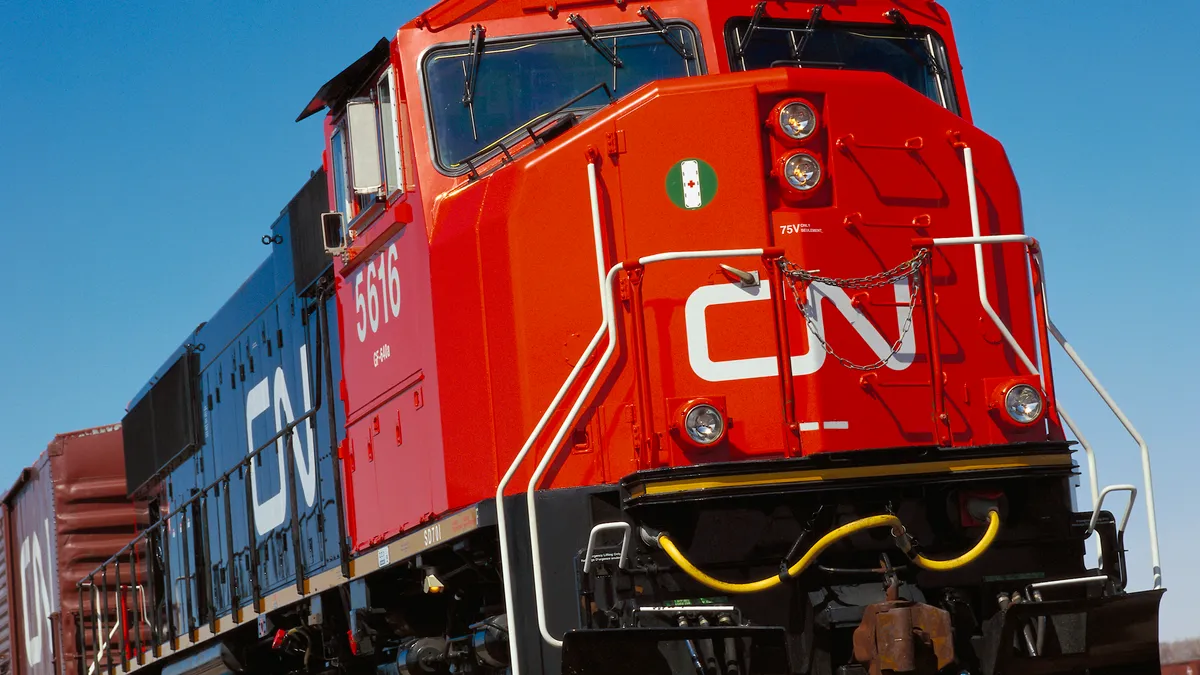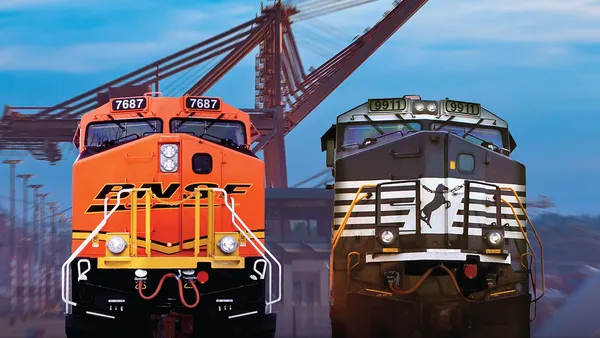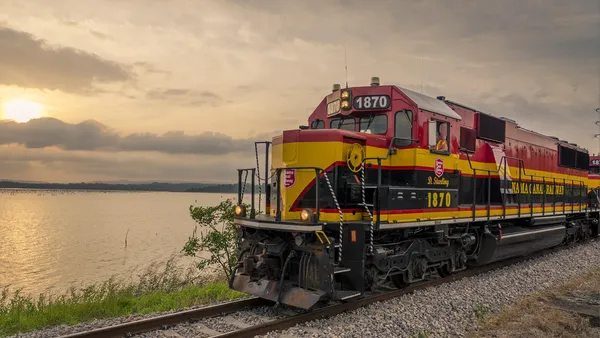Update: Feb. 14, 2020: Canadian National Railway began the process of shutting down operations in eastern Canada Thursday, the railroad announced in a statement. "This will include stopping and safely securing all trans-continental trains across its Canadian network," said the statement. Protests in Manitoba have ceased and are close to doing so in British Columbia, according to the statement, after efforts to enforce court orders obtained by the railroad. But these efforts have been less successful in Ontario.
CEO JJ Ruest said the railroad will shut down in a way that facilitates quick recovery if and when it is safe to do so. In the meantime, temporary layoffs of Canadian National employees in eastern Canada may be imminent. Canadian Pacific has not yet released public statements on the protests and did not respond to a request for comment in time for this update.
Dive Brief:
- Canadian National Railway will be forced to shut down two major sections of its network in eastern Canada if protestors currently blocking the tracks don't disperse, the railroad told customers Tuesday. The protest is in opposition to pipelines in the areas and not related to CN's activities, the railroad said.
- The protests are taking place near Belleville, Ontario, and in British Columbia between the cities of Prince George and Prince Rupert, affecting rail traffic moving from Western to eastern Canada and loads headed from eastern Canada to the U.S. Midwest.
- CN CEO JJ Ruest said the railroad has obtained court injunctions against the protests and is working with local law enforcement to enforce them. The railroad has canceled hundreds of trains in the five days since the protests began, but a total shutdown of the affected lanes would considerably increase the impact.
Dive Insight:
Intermodal containers along with loads of perishable goods, grain, chemicals, construction materials and propane have been blocked from crossing the country, Ruest said.
"It’s not just passenger trains that are impacted by these blockades, it’s all Canadian supply-chains," Ruest said in a statement. "We are currently parking trains across our network, but due to limited available space for such, CN will have no choice but to temporarily discontinue service in key corridors unless the blockades come to an end."
This is the second major disruption for CN in six months after the November conductors' and yard operators' strike brought the railroad's capacity down by 90% for roughly ten days.
Earnings results show the Canadian Class I railroads have generally had more success than U.S. railroads in holding onto their intermodal volume in a loose trucking market, but major disruptions like strikes and this pipeline protest are not helpful in that cause.
Shifts in Canadian freight markets also can reverberate below the border as carriers in the northern U.S. states may choose to head north seeking premium spot rates, lowering supply in the Midwest.
Charley Dehoney, CEO of Manning's Truck Brokerage in Omaha, Nebraska, told Supply Chain Dive he is watching these events closely, particularly after the November strike.
"We saw significant increases in outbound tender rejections for US-based carriers, especially those who operate in the northern part of the country, and even more with flatbed and specialized carriers," he said.
Though the trucking market in the U.S. is currently experiencing some incremental tightening, likely not attributed to the protests, according to Dehoney, shippers should be aware that history could repeat if the disruption persists.
"Generally speaking, carriers need three to four days to deliver freight in transit and plan for repositioning of assets during events like this. Brokerages and asset-based carriers alike are watching closely and paying attention to rates for sure," Dehoney said.
CN's main competitor, Canadian Pacific Railway, has been affected by the same pipeline protests, a spokesperson told Supply Chain Dive. The railroad, "continues to monitor the situation closely, in close collaboration with key stakeholders."
This story has been updated to include comments from Canadian Pacific.















